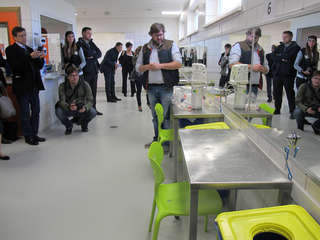
Established in 2005, this centre has offered a consumption room for drug users (including heroin and cocaine) and a night shelter, medical care, washing machines and wardrobes. This centre is therefore quite "unique" in the world, said Alain Origer, National "Drugs" Coordinator in Luxembourg. The concept is not yet widespread across the world: there are consumption rooms in five other EU Member States (Germany, Denmark, Spain, Norway and the Netherlands) as well as in Canada, Australia and Switzerland. In France, the Senate has given the green light for consumption rooms, on the condition that they are integrated into healthcare facilities. Alain Origer went on to explain that France, which "was inspired by the Luxembourg concept" to adapt its consumption rooms, is in process of putting in place a partnership with Luxembourg.
In order to access the room, users must take a ticket and wait in case the room is crowded, said Patrick Klein, Director of the Abrigado Centre. Almost 220 visits are made per day to the room, with a capacity of 14 places. Consumption is supervised by two people. The staff is composed of nurses, psychologists and educators, 36 in all, who receive regular training in resuscitation in the event of an overdose, with "2.5 per month" although no deaths have been reported, says Patrick Kleinur. The consumption room was set up to monitor consumption, to reduce the risks of overdose and improve safety for clients, as well as the community, as syringes are not disposed of in the environment. Of the 160 000 syringes used annually in the centre, 92% are disposed of there, says Patrick Klein. Consumption is prohibited outside the room.
"Our role is to talk with people, to counsel them. We allow them to use drugs just as if they had a disability and we offer solutions", he says. "There is no obligation to undergo rehabilitation because that is their decision", stresses Patrick Klein. Nevertheless, the centre can help to build bridges with hospitals or therapy and alternative treatment offers. Important social work is carried out on financial issues, accommodation and insurance status with the goal of "reducing the stress of life on the streets". "Our goal on one hand is to reintegrate users into the social system. On the other hand, we wish to stay in touch with the scene and be aware of current trends" says Patrick Klein.

Wound care specialists help clients heal their wounds, if needed. Nevertheless, nearly half prefer to inhale drugs in the "Blow Room". Clients are required to clean the table after each use. In the evening, the whole room is fully disinfected, as with an operating theatre, according to Patrick Klein.
Nearly 40% of clients who come to the Abrigado centre do not use drugs, says the Director. They can also wash their clothes, see a doctor who is available three times a week and deposit their belongings in a locked wardrobe.
For Patrick Klein, the drug scene in Luxembourg is "typical", dominated by heroin and cocaine. Consumers are "multiple drug users" who consume a number of drugs and psychedelic substances. "There are no pure heroin users", Patrick Klein reiterated. Nevertheless, the consumption of cocaine has increased to 10% (against 3% in 2004).
According to the Director, clients, only 10% of whom have jobs, are mainly from the lower social classes of Luxembourg society. The average age is about 33 years, but there is also a significant number of people over 45 (20 %). Between 15 and 20 % are women. The majority are from Luxembourg but Portuguese people also make up a significant proportion of clients.
Whereas nearly a quarter are homeless, the Abrigado centre tries to find a solution: a home, or a bed in the night shelter with 42 beds, including two rooms (six beds per room) which are reserved for women. Priority is given to women and drug users, but the centre also welcomes homeless people, and in urgent cases illegal refugees for a limited time.

